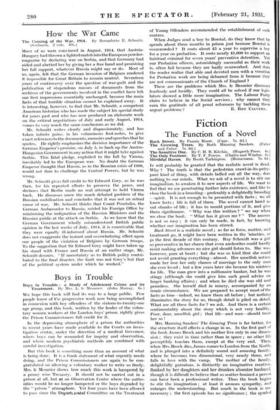How the War Came
The Coming of the War, 1914. By Bernadotte E. Schmitt. (Scribners. 2 vols. 30s.)
MOST of us were convinced in August, 1914, that Austria- Hungary had thrown a lighted match into the European powder- magazine by declaring war on Serbia, and that Germany had aided and abetted her by giving her a free hand and promising her full support, whatever Russia might say or do. Most of us, again, felt that the German invasion of Belgium rendered it impossible for Great Britain to remain neutral. Seventeen years of controversy over the question of war-guilt and the publication of stupendous masses of documents from the archives of the governments involved in the conflict have left our first impressions essentially unchanged, because the main facts of that terrible situation cannot be explained away. It is interesting, however, to find that Mr. Schmitt, a competent American historian who has made the subject his special study for years past and who has now produced an elaborate work on the critical negotiations of July and early August, 1914, comes to very much the same conclusions as we did.
Mr. Schmitt writes clearly and dispassionately, and has taken infinite pains, in his voluminous foot-notes, to give exact references to the documents, memoirs and speeches that he quotes. He rightly emphasizes the decisive importance of the German Emperor's promise, on July 5, to back up the Austro- Hungarian Government in any action that it might take against Serbia. This fatal pledge, exploited to the full by Vienna, inevitably led to the European war. No doubt the German Emperor thought that Russia, as in the Bosnian crisis of 1908, would not dare to challenge the Central Powers, but he was wrong.
Mr. Schmitt gives full credit to Sir Edward Grey, as he was then, for his repeated efforts to preserve the peace, and declares that Berlin made no real attempt to hold Vienna back. He discusses anew the much debated problem of the Russian mobilisation and concludes that it was not an actual cause of war. Mr. Schmitt thinks that Count Pourtales, the German Ambassador to Russia, misled his Foreign Office by minimising the indignation of the Russian Ministers and the Russian public at the attack on Serbia. As we know that the German Government wholly misunderstood British public opinion in the last weeks of July, 1914, it is conceivable that they were equally ill-informed about Russia. Mr. Schmitt does not exaggerate the instant and overwhelming effect upon. our people of the violation of Belgium by German troops. To the suggestion that Sir Edward Grey might have taken up his stand with France and Russia at an earlier stage, Mr. Schmitt demurs. " If uncertainty as to British policy contri- buted to the final disaster, the fault was not Grey's but that of the political system under which he worked."











































 Previous page
Previous page